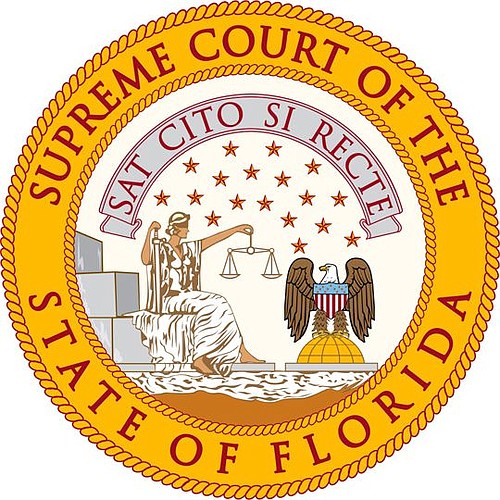
In another in a string of rulings siding with abortion-rights advocates, the Florida Supreme Court on Thursday blocked a 2015 law that would have required women to wait 24 hours before having abortions.
Thursday's 4-2 decision was the second time the state high court kept the law, approved by the Republican-dominated Legislature and signed by Gov. Rick Scott, from taking effect.
A Leon County circuit judge issued a temporary injunction blocking the law from being implemented, but the 1st District Court of Appeal overturned that decision a year ago.
The Supreme Court then issued a stay temporarily blocking the law while it considered the matter.
The appeals court pointed to a lack of evidence to support the temporary injunction, saying in part the circuit judge "failed to make sufficient factually supported findings about the existence of a significant restriction on a woman's right to seek an abortion."
But in Thursday's majority opinion overturning the appellate decision, Justice Barbara Pariente wrote that enactment of the law "would lead to irreparable harm."
The law would require women to make at least two visits to a health care provider before being able to have the procedure, Pariente noted.
"The mandatory delay law impacts only those women who have already made the choice to end their pregnancies. Indeed, under Florida's pre-existing informed consent law, a woman can already take all of the time she needs to decide whether to terminate her pregnancy, both before she arrives at the clinic and after she receives the counseling information," she wrote for the majority.
"No other medical procedure, even those with greater health consequences, requires a twenty-four hour waiting period in the informed consent process,” Pariente continued.
The law would require women seeking an abortion "to make an additional, unnecessary trip to their health care provider" that "could impose additional harms by requiring a woman to delay the procedure or force her past the time limit for the procedure of her choice," she wrote.
The American Civil Liberties Union of Florida filed the challenge on behalf of a Gainesville abortion clinic and a group of medical students, shortly after the law was passed. The lawsuit maintained the waiting period is an unconstitutional violation of right to privacy.
"Today we make clear, in Florida, any law that implicates the fundamental right of privacy, regardless of the activity, is subject to strict scrutiny and is presumptively unconstitutional," wrote Pariente, who was joined in the majority by Chief Justice Jorge Labarga and justices R. Fred Lewis and Peggy Quince.
But, in a dissent joined by Justice Ricky Polston, Justice Charles Canady accused the majority of taking "an unreasonably narrow view of the purpose of informed consent" and argued the plaintiffs had not presented any evidence to prove the 24-hour waiting period imposed "a significant restriction on the right to abortion."
And the law "enhances voluntary consent" by giving women more "post-informed reflective time free from undue influence" by doctors or clinic personnel, as well as more time to consider "the medical risks of terminating or not terminating a pregnancy," Canady wrote.
Justice Alan Lawson, who joined the court at the end of December, did not participate in Thursday's ruling.
The 2015 law is one of a number of anti-abortion measures approved by Republican lawmakers, even as the courts have repeatedly blocked the laws from going into effect.
A federal judge last summer issued a permanent injunction against a 2016 abortion law that would have led to increased inspections of clinic records and prevented abortion providers from receiving public money for other health services.
The ACLU filed a lawsuit challenging another portion of the same 2016 law that deals with people or organizations that provide advice to women considering abortions.
People or groups who provide information about abortions — considered "referral or counseling" agencies under the law — would have to register with the Agency for Health Care Administration, pay a $200 fee and could be charged with a felony for violating the statute.
A ruling in that case is pending.
Nancy Abudu, legal director for the ACLU of Florida, hailed Thursday's ruling in the waiting-period case. But lawmakers have filed a slew of anti-abortion bills again this year, she pointed out.
"Even though we've won this battle, the real war, in terms of protecting a woman's right to choose, is far from over," Abudu said. "So far, we're seeing some victories. We wish this would signal to the Legislature that they need to focus on other things."